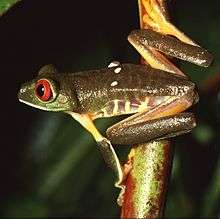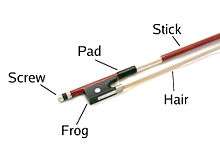Definify.com
Webster 1913 Edition
Frog
Frog
Webster 1828 Edition
Frog
FROG
,Definition 2026
Frog
frog
frog
English

Noun

frog (plural frogs)
- A small tailless amphibian of the order Anura that typically hops.
- The part of a violin bow (or that of other similar string instruments such as the viola, cello and contrabass) located at the end held by the player, to which the horsehair is attached.
- (Cockney rhyming slang) Road. Shorter, more common form of frog and toad.
- The depression in the upper face of a pressed or handmade clay brick.
- An organ on the bottom of a horse’s hoof that assists in the circulation of blood.
- The part of a railway switch or turnout where the running-rails cross (from the resemblance to the frog in a horse’s hoof).
Synonyms
- (amphibian: frog): frosh, frosk, frock
- (amphibian: frog or toad): pad, paddock
- (railway switch component): common crossing
Derived terms
Translations
|
|
References
- ↑ J.P. Mallory & D.Q. Adams, eds, Encyclopedia of Indo-European Culture, s.v. "Jump" (London: Fitzroy Dearborn, 1997), 323.
See also
Verb
frog (third-person singular simple present frogs, present participle frogging, simple past and past participle frogged)
- To hunt or trap frogs.
- (transitive, biology) To use a pronged plater to transfer (cells) to another plate.
Derived terms
- frog stitch
Etymology 2
From frog legs, stereotypical food of the French. Compare rosbif (“English person”), from roast beef, corresponding French term for English, likewise based on stereotypical food.
Noun
frog (plural frogs)
Antonyms
- (French person): rosbif (of an English, by French)
See also
References
- frog in Webster’s Revised Unabridged Dictionary, G. & C. Merriam, 1913
Etymology 3

Unknown. Possibly from Portuguese froco (“flock”), from Latin floccus (“flock”).
Noun
frog (plural frogs)
- A leather or fabric loop used to attach a sword or bayonet, or its scabbard, to a waist or shoulder belt.
- An ornate fastener for clothing consisting of an oblong button (covered with netted thread), toggle, or knot, that fits through a loop.
- 1844, Alexander Dumas, The Count of Monte Cristo:
- The visitor was about fifty-two years of age, dressed in one of the green surtouts, ornamented with black frogs, which have so long maintained their popularity all over Europe.
- 1844, Alexander Dumas, The Count of Monte Cristo:
Translations
|
Verb
frog (third-person singular simple present frogs, present participle frogging, simple past and past participle frogged)
Etymology 4
Supposedly from ribbit (“sound made by a frog”) sounding similar to "rip it".
Verb
frog (third-person singular simple present frogs, present participle frogging, simple past and past participle frogged)
References
“frog” in Douglas Harper, Online Etymology Dictionary (2001).
Irish
Etymology
Pronunciation
- IPA(key): [fˠɾˠɔɡ]
Noun
frog m (genitive singular froig, nominative plural froganna)
- frog (amphibian)
Declension
First declension
|
Bare forms:
|
Forms with the definite article:
|
Mutation
| Irish mutation | ||
|---|---|---|
| Radical | Lenition | Eclipsis |
| frog | fhrog | bhfrog |
| Note: Some of these forms may be hypothetical. Not every possible mutated form of every word actually occurs. | ||
Volapük
Pronunciation
- IPA(key): [fɾoɡ]
Noun
frog (plural frogs)
- frog (amphibian)
Declension
| singular | plural | |
|---|---|---|
| nominative | frog | frogs |
| genitive | froga | frogas |
| dative | froge | froges |
| accusative | frogi | frogis |
| predicative | frogu | frogus |
| vocative | o frog! | o frogs! |
Derived terms
- bimafrog
- braunafrog
- frogahilarvat
- frogajilarvat
- frogaküid
- frogalarvat
- frogav
- frogavan
- frogik
- frogil
- frogül
- frogülil
- grünafrog
- hifrog
- hifrogül
- jifrog
- jifrogül